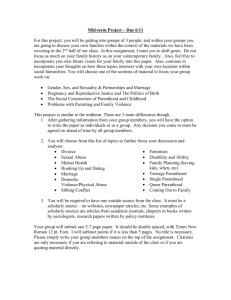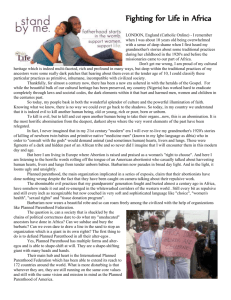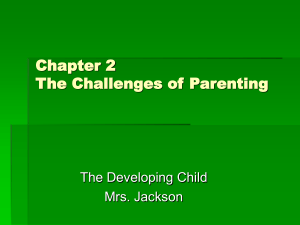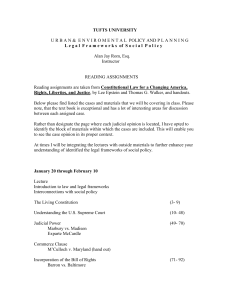Responsibilities of Parenting
advertisement
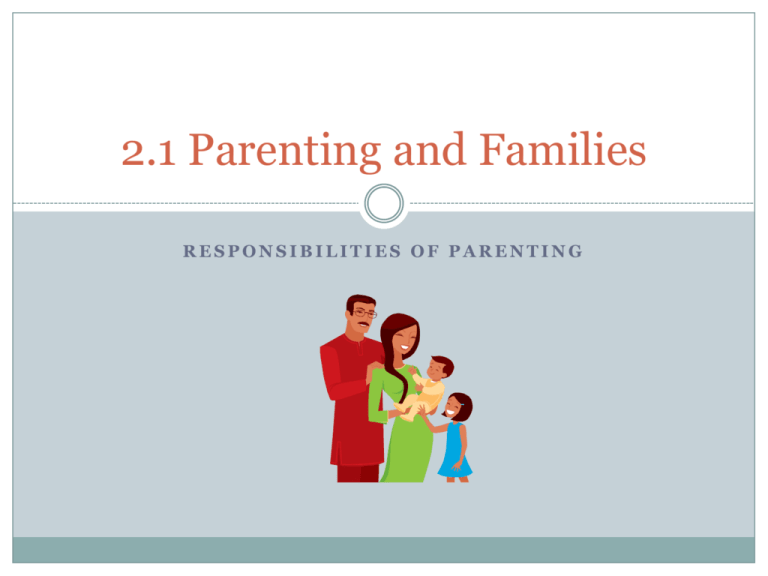
2.1 Parenting and Families RESPONSIBILITIES OF PARENTING Parenting The process of caring for children and helping them grow and develop. Can be very complicated. Impacts individuals, families, and societies One of the most important roles in a person’s life. Making a Positive Difference Treat others with kindness and consideration Some neighborhood children can benefit from having a teen friend. Volunteer or work with children Learning About Child Development What to expect when raising children What to expect when you are expecting Parenting skills Discipline options Learn and understand what the child may be going through (developmental stages) Interacting with children positively Parenthood Readiness Parenting Skills- can be learned!! Take classes in child development and parenting in school, at hospitals, community groups, and private instructors. Read reliable books, magazine articles, etc. Gain experience Ask for advice Observe parents and children Stages of Parenthood Psychologist Ellen Galinsky Between Generations: The Six Stages of Parenthood Research finding based on interviews with parents Galinsky describes how parents develop through their interaction with their children. Stages of Parenthood Stage 1: Image-Making Time Period: Pregnancy Parents’ Task: Begin to imagine themselves as parents. Stages of Parenthood Stage 2: Nurturing Time Period: Birth to Age 2 Parents’ Task: Become emotionally attached to the child. May question relative worth of other priorities Stages of Parenthood Stage 3: Authority Time Period: Age 2 to 4 or 5 Parents’ Task: Determine rules Clarify role as authority figure Stages of Parenthood Stage 4: Interpretive Time Period: Age 4-5 to Age 13 Parents’ Task: Rethink their role as parents Decide what knowledge, skills, and values the child needs Stages of Parenthood Stage 5: Interdependent Time Period: Adolescence Parents’ Task: Establish boundaries Find disciplinary methods appropriate for teens Stages of Parenthood Stage 6- Departure Time Period: Child leaves home Parents’ Task: Evaluate their parenting New Responsibilities / Changes Lifestyle Change Less free time (or “ME” time) Emotional Adjustment Stressful Negative emotions are normal (fear, frustration, worry, jealously, depression due to exhaustion) Relationship Changes COMMUNICATE!!!!! Employment Adjustments Legal Responsibilities Rewards Can bring a lot of joy and happiness See the world differently Enrich an already strong marriage / family Great sense of accomplishment and pride What are the five area’s of parenthood readiness? Emotional Maturity Desire to be a parent Health Financial Responsibility Resource Management Parenthood Readiness Emotional Maturity- being responsible enough to consistently put someone else’s needs before your own needs. Parenthood Readiness Desire for Parenthood Do you want to have children? Why do you want children? Are you ready to handle the challenges of parenthood? Parenthood Readiness Health Consideration- get a medical check up. Some medical problems can affect the health of the baby or the parents’ ability to care for a child. Consider Age: under 17 or over 35 pregnancy is riskier for both the mother and baby. Parenthood Readiness Financial Concerns- Raising a child is expensive. How will you pay for clothes, health care, food, equipment, toys, childcare, etc. Parenthood Readiness Resource Management Skills- parents need to use their resources wisely. Five Key Steps: 1. 2. 3. 4. 5. Set Goals- what is important. Identify Resources- make a list Make a Plan- decide how you will use your resources Put the Plan in Action- start working towards the goal. Re-Evaluate from Time to Time- step back and take a look at progress. Family Goals Buying a house Buying a Car Sending the child to preschool Education Vacation
